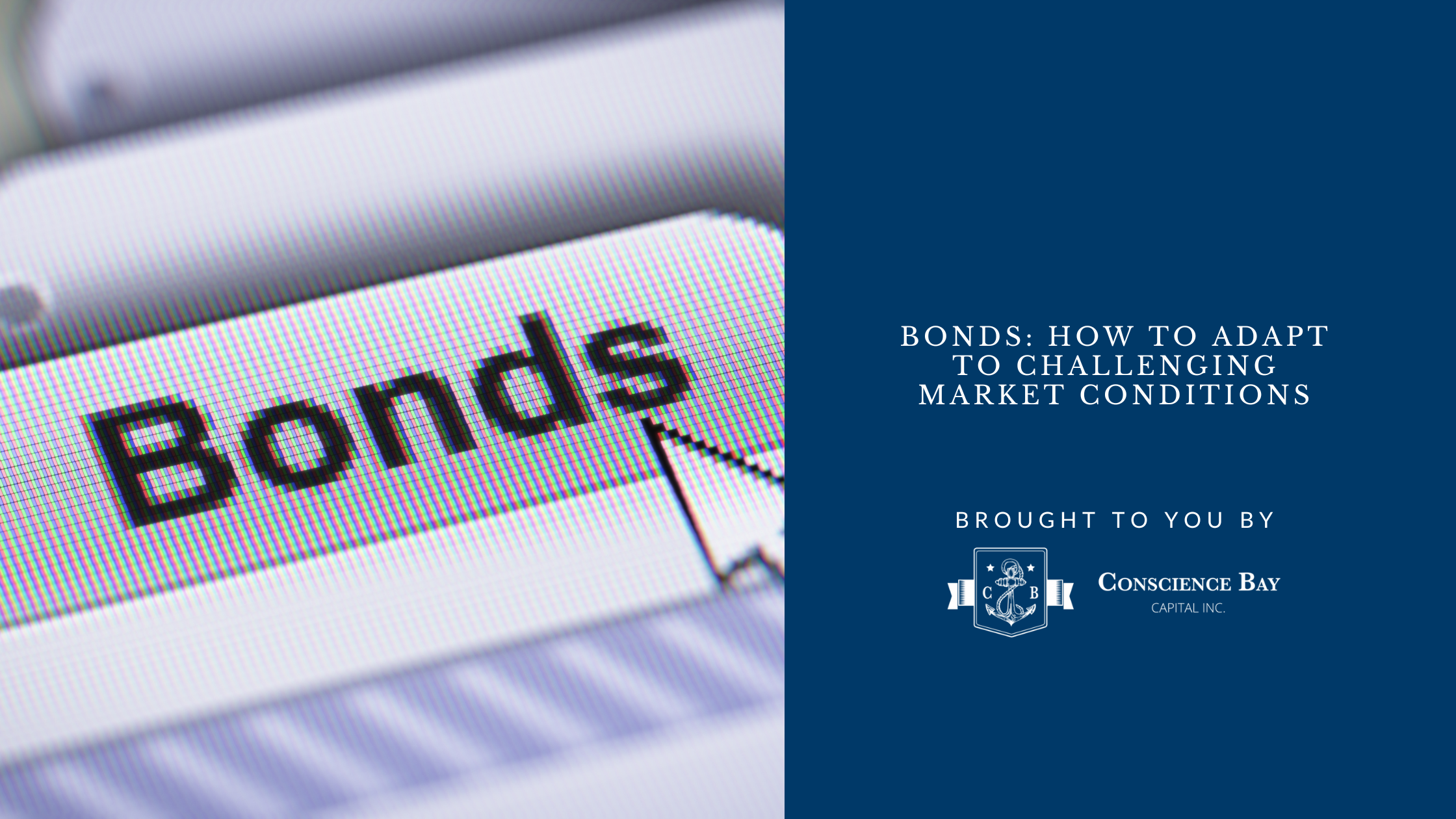Bonds: How to Adapt to Challenging Market Conditions
Submitted by Financial Investment Management | Conscience Bay Capital on January 24th, 2024
In today’s current financial environment, investors are experiencing the challenges of managing their investment portfolio through a volatile market with an uncertain future. For more than a year, bond return on investments has been less than favorable, and the question we have to ask ourselves is, are bonds even worth having in our portfolio anymore?
What are bonds?
Buying a bond means you are making a loan to an organization. It is essentially an IOU given by the borrower (the issuer) to a lender (the investor).
How do bonds work?
When bonds are bought, the issuer pays regular interest payments, also called a coupon, and the principal amount if the bond is returned. New bonds get issued with a higher coupon rate when interest rates rise. Therefore, the investor will receive higher interest payments. Older bonds with a lower coupon value will be priced at a discount to be more attractive.
Bonds generally offer a reasonably predictable income stream, paying interest, typically twice yearly. Bonds are also a helpful investment opportunity because they diversify your portfolio and are considered a more conservative investment compared to stocks. You purchase bonds for a period of time, 2-year, 5-year, 10-year, or 30-year, depending on which time horizon you will earn interest at that rate. Let’s use U.S. Treasuries for example in this hypothetical to visualize interest rates and time horizons:
U.S. Treasuries
2-year T-Note – yielding 5.105%
5-year T-Note – yielding 4.608%
10-year T-Note – yielding 4.667%
30-year T-Note – yielding 4.810%
*This is a hypothetical example and is not representative of any specific current investment yield.
When adapting your investment strategy to a changing market, you must be conscious that a rising coupon doesn’t constitute a strong market now or in the future. Purchasing individual bonds carries its own set of challenges, and investors instead will acquire bonds through exchange-traded funds (ETFs) or mutual funds compiled by an experienced fund manager after researching the bond issuers to mitigate unnecessary risk. However, after bonds have struggled, buying individual bonds may help provide you with more control of your investment.
Understanding bond market volatility
2022 is the worst-ever year on record for bond investors in the United States, beating out 1980, 1926, and 1754, when the bond market also experienced a significant downturn. The most recent cause was partly due to the Federal Reserve raising interest rates so aggressively to combat inflation. As interest rates rise, bond prices fall. The bonds that were most negatively affected were long-term bonds which dropped over 39%.
Here are several ideas to consider in a distressed market to help mitigate bond investment risk:
Benefit of short-term bonds
Short-term bonds can help reduce portfolio volatility during challenging market conditions. For investors interested in this type of strategy, money market funds have the shortest time horizon.
Look outside the bond market
If the bond market suffers like it did in 2022 or 1980, bond investors can temporarily consider other avenues including real estate interests, dividend stocks, index funds, certificates of deposit, collectibles or other alternative investments.
You can’t predict the future
There is no way to predict what future years will be like and any investment should be pursued within your risk-tolerance.
Pros and Cons of owning bonds
Pros:
· Preservation of capital
· Steady income stream
· Exempt from income tax
· Exempt from state and local taxes
Cons:
· Interest rate risk
· Liquidity risk
· Credit risk
· Call risk
· Inflation risk
With any investment, there is risk involved, even with bonds that are known for being an essential addition to a portfolio to help lessen the blow experienced by stocks during a volatile market. Consider consulting a financial professional who can review your portfolio with you, help you create strategies, and rebalance your portfolio to align with your long-term financial goals.
Important Disclosures:
The opinions voiced in this material are for general information only and are not intended to provide specific advice or recommendations for any individual. To determine which investment(s) may be appropriate for you, consult your financial professional prior to investing.
Bonds are subject to market and interest rate risk if sold prior to maturity. Bond values will decline as interest rates rise and bonds are subject to availability and change in price.
Bond yields are subject to change. Certain call or special redemption features may exist which could impact yield.
An investment in Exchange Traded Funds (ETF), structured as a mutual fund or unit investment trust, involves the risk of losing money and should be considered as part of an overall program, not a complete investment program. An investment in ETFs involves additional risks such as not diversified, price volatility, competitive industry pressure, international political and economic developments, possible trading halts, and index tracking errors.
Investing in mutual funds involves risk, including possible loss of principal.
An investment in the Money Market Fund is not insured or guaranteed by the Federal Deposit Insurance Corporation or any other government agency. Although the Fund seeks to preserve the value of your investment at $1.00 per share, it is possible to lose money by investing in the Fund.
All information is believed to be from reliable sources; however, LPL Financial makes no representation as to its completeness or accuracy.
This article was prepared by LPL Marketing Solutions
Sources: Treasury: Series I bond rate is 5.27% through April 2024 (cnbc.com) Best Bonds to Buy in 2023 | The Motley Fool Investment Grade Credit Rating Details: What Does It Mean? (investopedia.com) What's the Deal With Bonds Right Now? | Kiplinger
LPL Tracking # 503584

